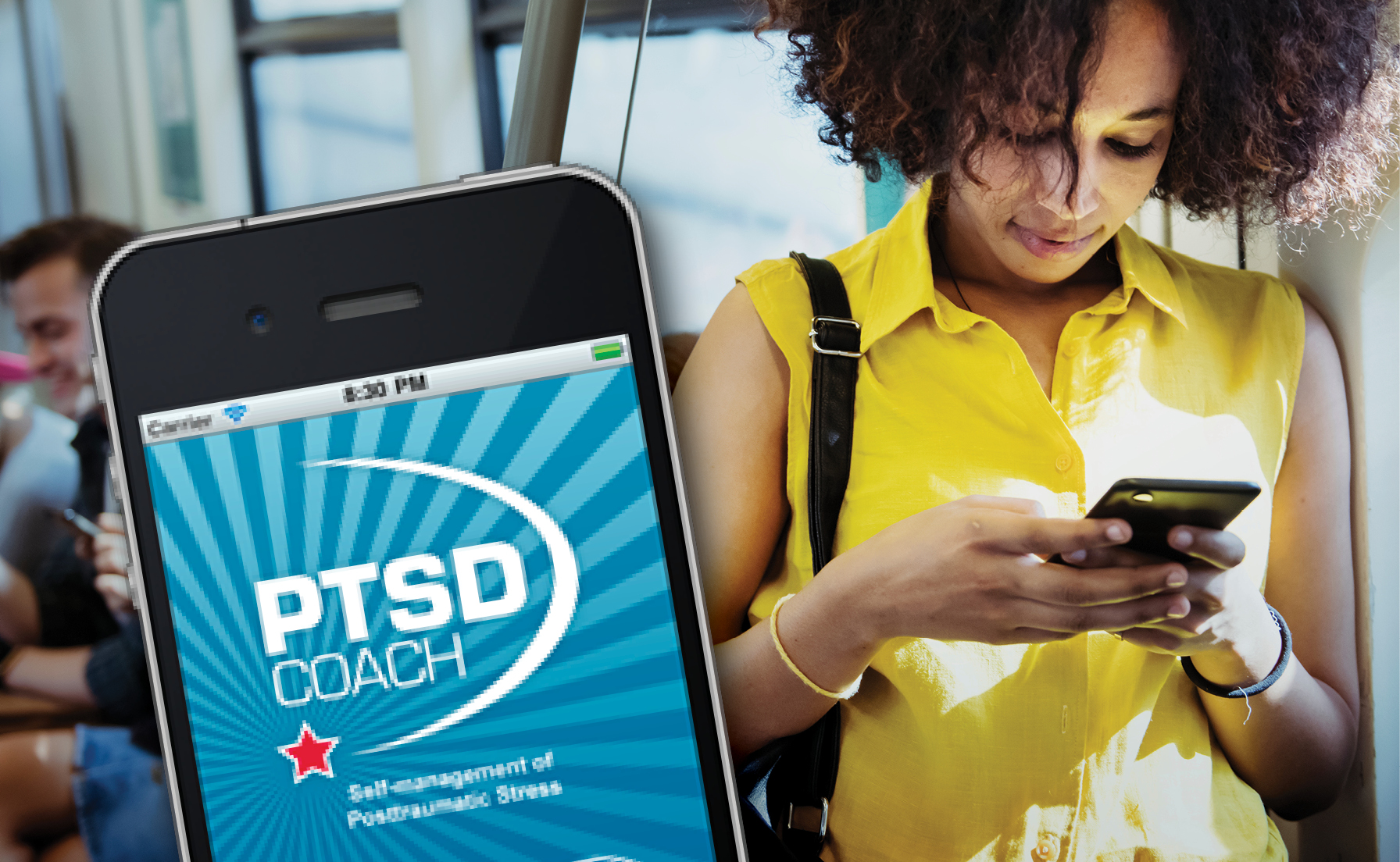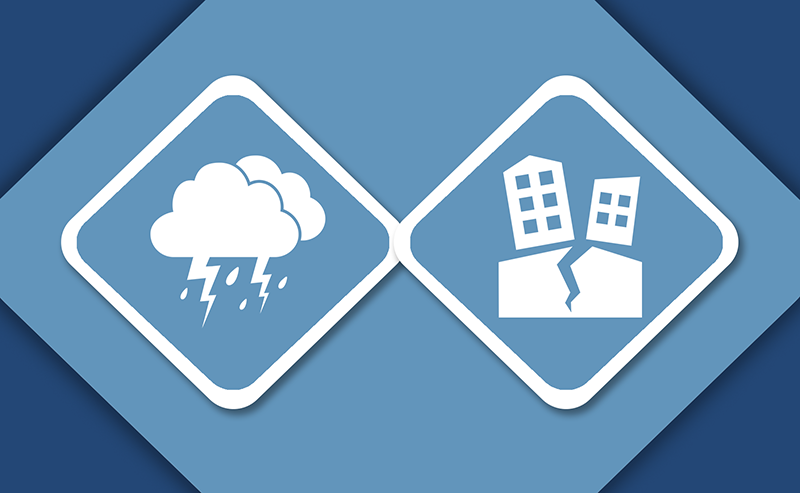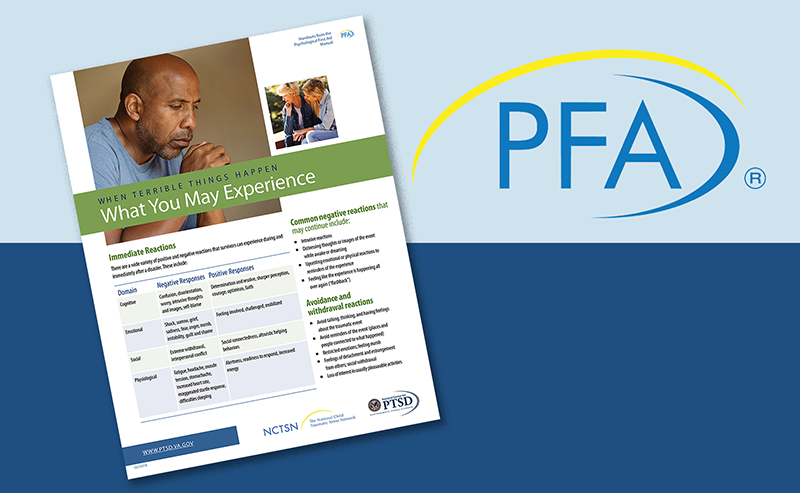PTSD: National Center for PTSD
Effects of Disaster Events: Resilience and Risk Factors
Effects of Disaster Events: Resilience and Risk Factors
If you live in an area affected by a disaster event, it is likely you will experience stress reactions. There are factors that make it more likely you will have ongoing reactions after a disaster event. These are risk factors. There are also factors that make it more likely you will recover. Such resilience factors are things that help you "bounce back" after a traumatic event. Learn about risk and resilience factors and how they affect your ability to cope with disaster events.
Reading time: minutes
Every year, millions of people around the world are affected by both human-caused and natural disasters as well as other disaster events. Disasters include hurricanes, tornados, floods, earthquakes, fires, hazardous material spills, explosions, mass violence events, or public health emergencies. In such events, you face the danger of death or physical injury. You may also lose your home, possessions, or community. Such stressors can place you at risk for physical and mental health problems.
Stress reactions after a disaster event look very much like the common reactions seen after any type of trauma. Disaster events can cause a full range of mental and physical reactions. You may also react to problems that occur after the event, as well as to reminders of the trauma, sometimes called "triggers". At the same time, there are factors that can help you respond and recover following a disaster event. These resilience factors can impact how much or how long stress reactions affect you.
Resilience Factors
Most people who are directly affected by disaster events recover. Human nature is resilient, and most people are able to adapt, or "bounce back," over time after a disaster event. People sometimes also report positive changes after disaster events. They may rethink what is truly important and come to appreciate what they value most in life. Certain factors increase resilience after disaster events, as described below.
Social support is one of the strongest keys to recovery after disaster events. Social support increases well-being and limits distress. Being connected to others makes it easier to obtain knowledge needed for recovery. This can be practical support for solving problems or finding and getting access to recovery services. It can also mean finding comfort in being understood by people who have shared your experience and getting tips about coping.
Having good coping skills after a disaster event is important. Coping self-efficacy—the belief in one's ability to get through difficult times—is related to better mental health outcomes for those affected by disaster events. When you think that you can cope with the results of a disaster event, you tend to do better.
Hope is also related to better outcomes after disaster events. Hope can come from many sources and be expressed in diverse ways. A belief that outside sources—such as local community members, volunteer organizations, or government agencies—are acting on your behalf can foster hope. Hope may spring from religious faith, belief in a Higher Power, or spirituality. Hope may also come from a general sense that things will work out well and that positive things can be expected or even predicted. The presence of practical resources—like housing, a job, and money—can foster hope.
Risk Factors
Most people who have gone through a disaster event will recover. However, there are risk factors that make adapting to life after the disaster event more challenging.
Some risk factors have to do with what happened during the disaster event itself. People who directly experience these events are most at risk for more severe or longer-lasting stress reactions. This is even more true if they are injured, face threats to their lives, suffer losses or significant changes, or had a family member or close friend injured or killed in the disaster event. Being in close contact with people affected by the disaster event also increases risk that you will be impacted.
Other factors that increase risk are feeling panic or horror during the event, loss of property, and being forced to leave home. Being separated from family members also increases risk. Family separation causes the most risk for youth.
And finally, people going through a disaster event for the first time may have a harder time recovering than those who have faced them before.
While social support is a key for recovery, it can weaken during and after disaster events. This may be due to stress and the need for members of the support network to focus on or get on with their own lives. Sometimes the responses from others you rely on for support are negative. For example, friends and neighbors may play down your problems, needs, or pain, or expect you to recover more quickly than is realistic. Responses like these are strongly linked to long-term distress.
On a community level, social support can also be further weakened for those who have been historically excluded or who have experienced inequity with regard to support or resources.
Summing It Up
Disaster events can cause both mental and physical reactions. Being more directly affected by the event and having weak social support can make recovery more challenging. On the other hand, being connected to others, being confident that you can handle the results of the disaster event, and being hopeful, can make recovery more likely. While most people will recover in time, for those with higher risk, self-care and seeking help are recommended. To learn more about coping after any kind of traumatic event, see Self-Help and Coping.
You May Also Be Interested In


























